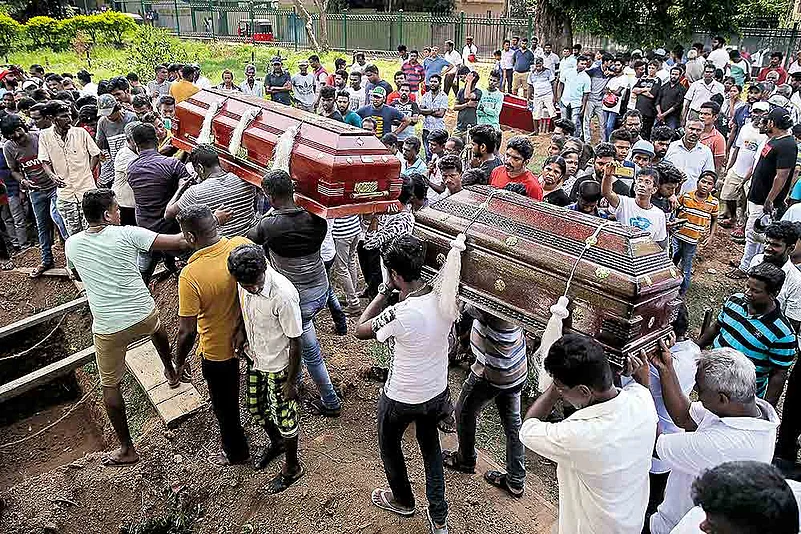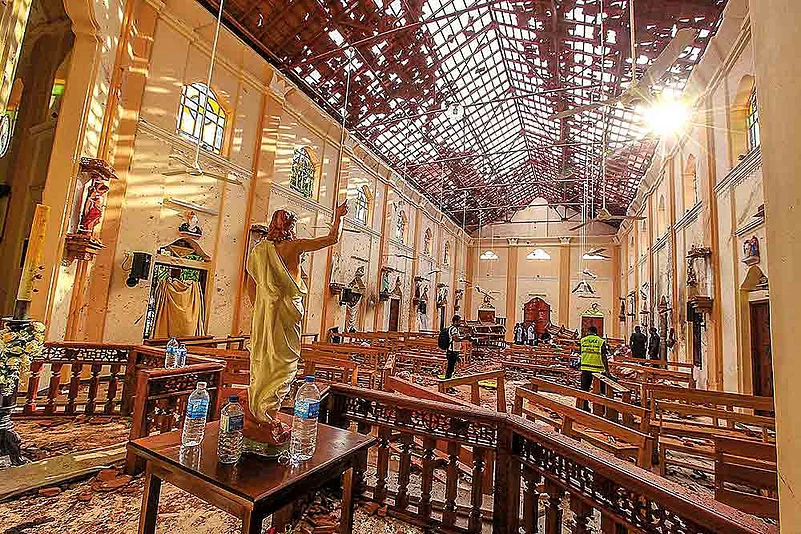Sri Lanka is no stranger to bloodshed. In its seven-decade history as an independent nation, it has gone through long spells of violence, losing prominent leaders to suicide bombers—pioneered by the Liberation Tigers of Tamil Elam (LTTE)—and consumed by a 26-year period of ethnic strife that convulsed Sri Lankan society and tore it asunder. That dark chapter seemed to have ended in 2009, when the Sri Lankan military eliminated most LTTE fighters along with their chief, Velupillai Prabhakaran, after a protracted civil war.
The resultant Sinhalese triumphalism that arose from its ashes brought some ultra-nationalist Buddhist outfits to the fore. Several had been responsible for the rising communal tension between Buddhists and Muslims. Last year in Kandy, when a truck driver succumbed to his injuries following a fight with some Muslim boys, ultra-nationalist Buddhist outfits whipped up communal passion, resulting in a riot in which one Muslim was killed and several others injured as their shops and property were destroyed.
Therefore, Easter Sunday’s mind-numbing terror attacks, directed mainly at Christians, come as a surprise. Christians comprise about seven per cent of Sri Lanka’s total population (22 million). Unlike Hindu Tamils and Muslims, who have been victims of communal attacks, Christians were never a target.
That peace was shattered on April 21, when seven well-orchestrated and synchronised bombs were detonated by explosives-carrying bombers on a number of churches and high-end hotels in Colombo and elsewhere in the island. The blasts trampled upon the tranquility of Easter Sunday, killing 359 people, over 45 of them children, and injuring 500 others as they gathered to celebrate one of the holiest days in the Christian calendar.
For some unknown reason, though a series of intelligence inputs from India and other countries had warned Lankan authorities about the imminent attack, Colombo failed to act on them. It cost the country dear.
Also significantly, President Maithipala Sirisena and Prime Minister Ranil Wickremsinghe both claimed that the intelligence warning was not shared with them. Sirisena admitted, “I must be truthful and admit that there were lapses on part of defence officials.” But he also pointed out, “There was an intelligence report about the attack but I was not kept informed.” Addressing Sri Lankans for the first time since the attacks, he said in a televised speech on April 23 that those responsible for “negligence” would be removed, announcing a shakedown in the security structure at high places.
The ghastly intelligence and governance failure that allowed the attacks has, point out many, a connection with the tension between the president and the PM that had begun last year, when Sirisena tried to oust Wickremesinghe and call early parliamentary polls and then had to backtrack when he was overruled by the supreme court.
In a significant development that casts the attacks in a wider arc of influence and culpability, the ISIS has claimed the suicide bombers as its own. In a bulletin released by the group’s news agency, Amaq, it claimed the coordinated attacks were carried out by “Islamic State fighters.” It said the bombings targeted Christians and those countries that were part of the coalition fighting the ISIS. It also identified the seven bombers by their noms de guerre and specified their individual targets. Later, it released a video in which eight men were seen pledging allegiance to ISIS leader Abu Bakr al-Baghdadi.

Some of the victims of the Easter Sunday attacks are laid to rest in Colombo
“There seems to have been foreign involvement,” Wickremesinghe told newsmen. He said investigators believe that some of the attackers had gone abroad at some point. Initial suspicion pointed at links with the ISIS, he said, and now “some of the evidence points to that”.
Much of the focus is on a local Islamist group called the National Tawheed Jamaat (NTJ), which in turn had been an offshoot of the Tawheed Jamaat, often known for its rabid speeches against non-believers. But there are indications that though Lankan intelligence agencies kept the NTJ under watch (according to Sirisena, the NTJ was under surveillance since 2017), serious doubt remains whether they had the wherewithal and the training to execute synchronised attacks of such sophistication. “There was little indication that it would gain the capacity to carry out such large-scale and well-planned attacks that have affected every stratum of our society and beyond,” Sirisena said. “They gained these abilities in an extremely unexpected way.”
The Easter Sunday bombings in Sri Lanka reminded many Indians of the bloody mayhem of the 26/11 Mumbai terror attacks. Though it happened over 10 years back, the synchronised attacks, the suicide mission of the attackers, the carefully chosen targets, the high number of foreigners among the victims…all show a clear parallel between the two episodes.
One of the objectives of the Mumbai attack was to derail India’s economic growth and scare away potential foreign investors. Over the past decade or so, the Sri Lankan economy had also picked up, particularly its tourist trade and investment from the Arab world. The attack’s motive could well have been to stall Lanka’s economic growth and besmirch its open, tourist-friendly attitude.
But the ISIS-inspired suicide bombers, if they belonged to the NTJ at all, have left behind several questions. How did they manage to acquire such skills in such a short time? Moreover, why did they go after the Christians, and not the majority Buddhist community, since the tormentors of Muslims in Sri Lanka in the recent past had belonged to hardline Buddhist groups? And how is it that attacks on mosques and Muslims in Christchurch were a stronger motive than the reported harassment of Muslims in Sri Lanka?
Caught wrong-footed by the attacks, Sri Lanka’s government now has the task of maintaining peace, beyond re-empowering the military and imposing curfew. There are reports that some Muslim households in mixed areas of Sri Lanka were attacked in retaliation. Whether they would escalate and lead to a major communal riot is something that depends on how the government handles the situation.
Furthermore, much of these developments are now being played out under the emerging political atmosphere for the year-end presidential elections in Sri Lanka. Both Sirisena and Wickremesinghe are aspirants for the coveted post. However, both leaders have now been tainted by their inaction to take necessary measures to prevent the Easter Sunday attacks. There is a feeling that they were so caught up in their infighting that they did not care for the rest of the country and its security.
Former president Mahinda Rajapaksa seems to be in a relatively stronger position in this entire tragedy. Since he is not in the government there can be no fingers pointed at him. Moreover, many in Sri Lanka still remember him as the man who ended the decade-long ethnic strife. Will the emerging scenario now benefit him?
There are six months left for the presidential elections in Sri Lanka—other developments can take political centrestage and dominate political discourse, consigning the gruesome attacks of April 21 to the background. While the jury is still out on how big an issue the Easter Sunday attacks will be in Sri Lankan politics, there is little doubt that for now terrorism is back on the political agenda.
Communally motivated outrages can easily be manipulated for cynical political gains. Whether Sri Lanka’s minority Muslims end up paying the price for an act of vile terror will depend largely on how politicians play their cards. Peace and amity cannot, after all, be taken for granted in the fragmented world we inhabit.

























